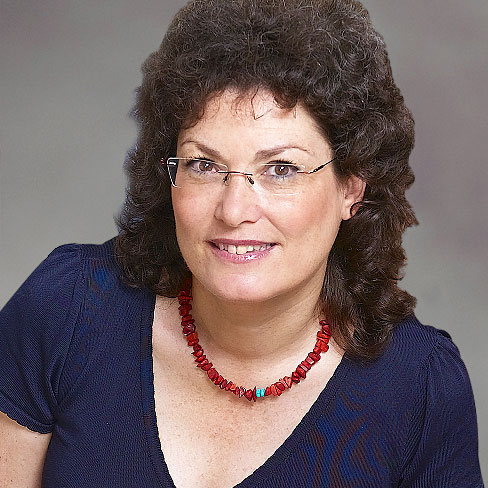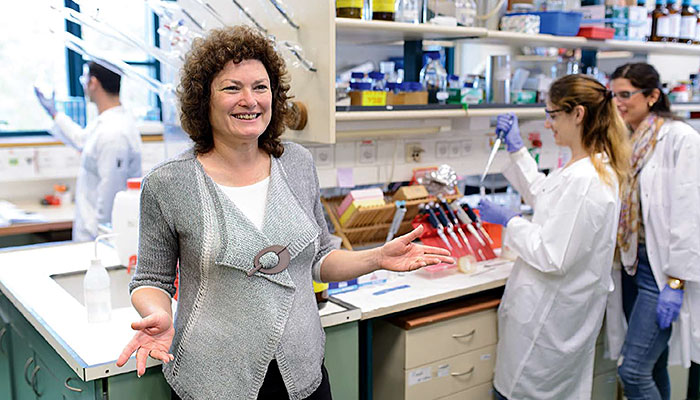Towards Personalized Medicine: Cancer patients want effective medical care, and they want it now. But when it comes to cancer of the breast, there’s a problem: the initial diagnosis sometimes marks the beginning of a long process, in which doctors struggle to identify the best therapeutic approach.

Prof. Bilha Fischer
BIU Prof. Bilha Fischer is facing this problem with a new biotechnological solution — a fluorescent probe that shines a light on individual tumors’ hidden characteristics.
Breast Cancer: Not a Single Condition
“In our lab, we’re diagnosing breast cancer, which is not a single condition, but rather a family of diseases, each characterized by the presence of specific molecular markers,” says Fischer, an expert in medicinal chemistry who holds eleven patents, has published more than 90 papers, and today chairs BIU’s Chemistry Department.
“To ensure effective treatment, we need a molecular-level diagnosis of each tumor. This would allow doctors to choose the personalized strategy of chemotherapy, radiation or surgery that is most likely to work.”
Probes Identify Specific mRNA Markers Present in Cancer Cells
According to Fischer, the key to tumor “fingerprinting” lies in small pieces of genetic information called messenger RNA, which are involved in transforming genes into the biologically active proteins. “We’ve created novel fluorescent probes that identify the specific mRNA markers present in cancer cell extracts,” she explains. “When the probes meet up with their targets, the double strands of the DNA probes unzip, triggering a bright fluorescent signal that provides molecular-level proof of the tumor’s genetic profile.”
 Fischer’s system could potentially be used for early cancer detection, for defining the treatment course, and for enabling post-operative monitoring of patients. “Today, doctors identify breast cancer with a combination of ultrasound and histochemistry, but have no means of defining the individual tumor type,” she says. “Our method — which is simple, fast, cost-effective and very sensitive — could make the treatment of breast cancer more scientific, and save lives.”
Fischer’s system could potentially be used for early cancer detection, for defining the treatment course, and for enabling post-operative monitoring of patients. “Today, doctors identify breast cancer with a combination of ultrasound and histochemistry, but have no means of defining the individual tumor type,” she says. “Our method — which is simple, fast, cost-effective and very sensitive — could make the treatment of breast cancer more scientific, and save lives.”
Drug Candidates For The Treatment Of Glaucoma
In another area of her research, Fischer is developing drug candidates for the treatment of glaucoma — including one promising compound being explored within the framework of an early-stage incubator, sponsored by Israel’s Ministry of Industry, Trade and Labor.
“In our lab, we’ve synthesized a compound that lowers intra-ocular pressure by 45% — that’s almost 30% percent higher than the best drugs currently on the market,” Fischer says. “Our approach also offers an alternative for medications contraindicated for patients suffering from cardiovascular problems, diabetes or asthma. The incubator will help move this project along, so hopefully it can someday become a real treatment option.”
A scientist who has developed drugs for other diseases, including diabetes and Alzheimer’s, Fischer has yet to receive FDA approval for any of her discoveries. This is because the FDA process typically takes 20 years, longer than she has been working in biomedical research. Still, Fischer remains optimistic, and committed to helping others.
“Drug development is a marathon, not a sprint,” she says, “and patience is definitely part of the prescription. But when you compare our frustration to the suffering of the people who have these diseases, it gives you perspective. The difficulties we face are really very small.”
To learn more about Prof. Fischer, or to support her work,
call Howard Charish at 212-906-3900 or email howard.charish@afbiu.org


